初二第一学期英语同步辅导一U1A
- 格式:doc
- 大小:289.00 KB
- 文档页数:8
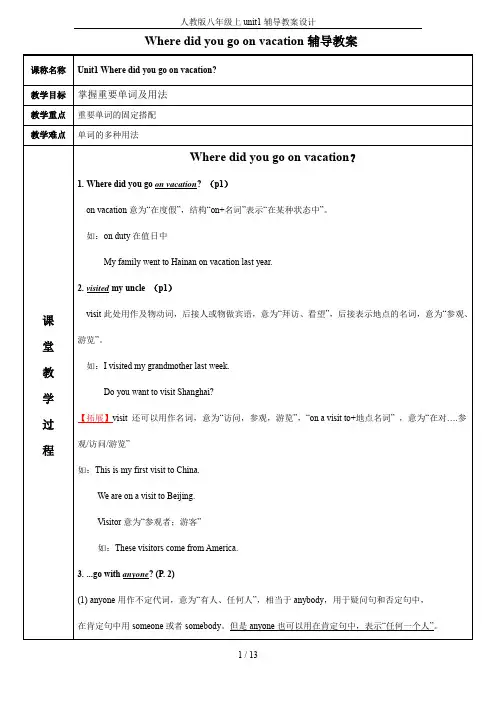
Where did you go on vacation辅导教案课称名称Unit1 Where did you go on vacation?教学目标掌握重要单词及用法教学重点重要单词的固定搭配教学难点单词的多种用法课堂教学过程Where did you go on vacation?1.Where did you go on vacation? (p1)on vacation意为“在度假”,结构“on+名词”表示“在某种状态中”。
如:on duty在值日中My family went to Hainan on vacation last year.2.visited my uncle (p1)visit此处用作及物动词,后接人或物做宾语,意为“拜访、看望”,后接表示地点的名词,意为“参观、游览”。
如:I visited my grandmother last week.Do you want to visit Shanghai?【拓展】visit 还可以用作名词,意为“访问,参观,游览”,“on a visit to+地点名词” ,意为“在对….参观/访问/游览”如:This is my first visit to China.We are on a visit to Beijing.Visitor意为“参观者;游客”如:These visitors come from America.3....go with anyone? (P. 2)(1)anyone用作不定代词,意为“有人、任何人”,相当于anybody,用于疑问句和否定句中,在肯定句中用someone或者somebody。
但是anyone也可以用在肯定句中,表示“任何一个人”。
如:Did you meet anyone friendly in that city?Anyone can be helpful in some way.(2)anyone只能指人,不可以指物,后面不接of短语;any one既可以指人也可以指物,后可接of短语。
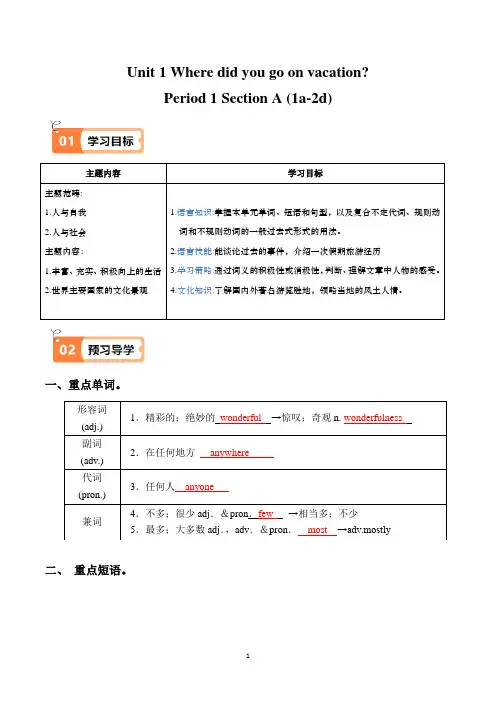
Unit 1 Where did you go on vacation?Period 1 Section A (1a-2d)主题内容学习目标主题范畴: 1.人与自我 2.人与社会 主题内容:1.丰富、充实、积极向上的生活2.世界主要国家的文化景观1.语言知识:掌握本单元单词、短语和句型,以及复合不定代词、规则动词和不规则动词的一般过去式形式的用法。
2.语言技能:能谈论过去的事件,介绍一次假期旅游经历3.学习策略:通过词义的积极性或消极性,判断、理解文章中人物的感受。
4.文化知识:了解国内外著名游览胜地,领略当地的风土人情。
一、重点单词。
二、 重点短语。
形容词 (adj.) 1.精彩的;绝妙的 wonderful →惊叹;奇观n. wonderfulness 副词 (adv.) 2.在任何地方 anywhere 代词 (pron.) 3.任何人 anyone兼词4.不多;很少adj .&pron .few →相当多;不少 5.最多;大多数adj .,adv .&pron . most →adv.mostly1.去度假go on vacation 2.去爬山go hiking3.待在家里stay at home 4.去夏令营go camping5.去海滩go to the beach 6.参观博物馆visit a museum 7.备考prepare for thee text 8.外出go out9.照相take photos 10.大部分时间most of the time三、重点句型。
1.I went to the mountains .我去爬山了。
2. We took quiet a few photos there.我们在那里拍了不少照片。
2.I just stayed at home most of the time to read and relax.我大部分时间都待在家里看书放松。
4.(听说-询问信息)你上个月做了什么特别的事吗?(翻译句子)Did you do anything special last month?5.(听说-询问信息)你上个月和谁去贵州了?(翻译句子)Who did you go to Guizhou with last month?依据课时重点内容,归纳问题(重难点、易错点)呈现如下:►:重难点1:We took quite a few photos there. (P2)【探索】(1)Kate was a little shy and made few friends at school.(2)Don't worry! You still have a little time.(3)I have little time for reading because I have to look after my little brother.【基础练】我的老师刚刚与我分享了几个方法。
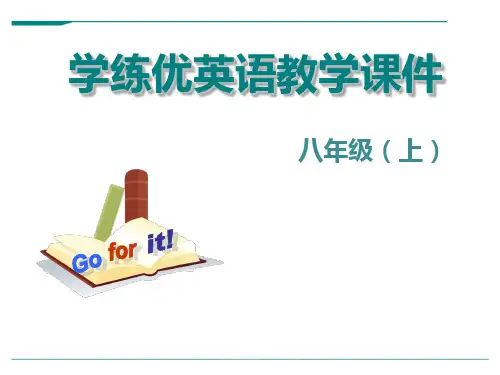
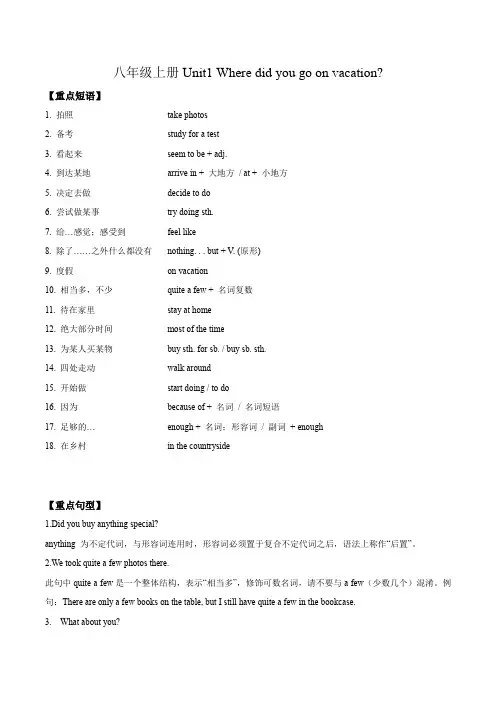
八年级上册Unit1 Where did you go on vacation?【重点短语】1. 拍照take photos2. 备考study for a test3. 看起来seem to be + adj.4. 到达某地arrive in + 大地方/ at + 小地方5. 决定去做decide to do6. 尝试做某事try doing sth.7. 给…感觉;感受到feel like8. 除了……之外什么都没有nothing. . . but + V. (原形)9. 度假on vacation10. 相当多,不少quite a few + 名词复数11. 待在家里stay at home12. 绝大部分时间most of the time13. 为某人买某物buy sth. for sb. / buy sb. sth.14. 四处走动walk around15. 开始做start doing / to do16. 因为because of + 名词/ 名词短语17. 足够的…enough + 名词;形容词/ 副词+ enough18. 在乡村in the countryside【重点句型】1.Did you buy anything special?anything 为不定代词,与形容词连用时,形容词必须置于复合不定代词之后,语法上称作“后置”。
2.We took quite a few photos there.此句中quite a few是一个整体结构,表示“相当多”,修饰可数名词,请不要与a few(少数几个)混淆。
例句:There are only a few books on the table, but I still have quite a few in the bookcase.3. What about you?about 为介词,后接动词要跟动词ing形式4. Everything tasted really good!taste 为感官系系动词,意为“尝起来”,后跟形容词作表语。
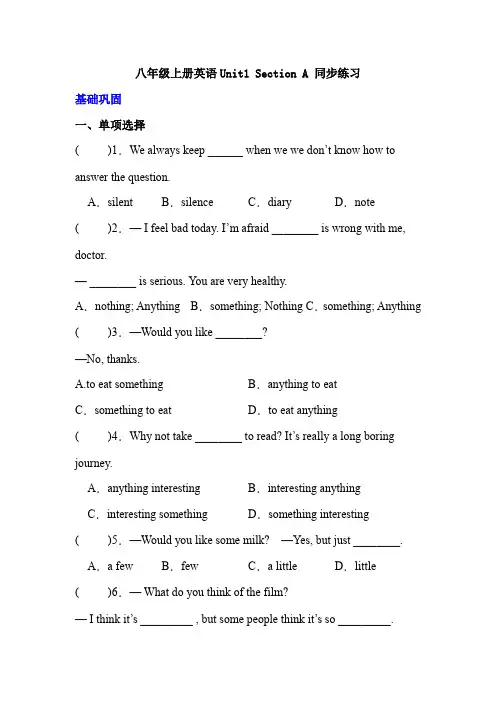
八年级上册英语Unit1 Section A 同步练习基础巩固一、单项选择( )1.We always keep ______ when we we don’t know how to answer the question.A.silent B.silence C.diary D.note( )2.— I feel bad today. I’m afraid ________ is wrong with me, doctor.— ________ is serious. You are very healthy.A.nothing; Anything B.something; Nothing C.something; Anything ( )3.—Would you like ________?—No, thanks.A.to eat something B.anything to eat C.something to eat D.to eat anything( )4.Why not take ________ to read? It’s really a long boring journey.A.anything interesting B.interesting anything C.interesting something D.something interesting( )5.—Would you like some milk?—Yes, but just ________. A.a few B.few C.a little D.little( )6.— What do you think of the film?— I think it’s _________ , but some people think it’s so _________.A.enough wonderful; bored B.wonderful enough; boring C.enough wonderful; boring D.wonderful enough; bored ( )7.— Could I go to the movies with Lucy?— ________, but remember to come back before 10 p.m.A.You’re right B.I am afraid soC.I don’t think so D.Of course( )8.—What do you think of the film?—The story itself is ________, but I felt ________ because it’s too long.I have to sit in the cinema for more than three hours.A.excited; boring B.exciting; boring C.exciting; bored D.excited; bored( )9.-How was your vacation, Lily?-.A. Everyone was on vacationB. It was wonderfulC. I bought nothingD.She went to the mountains( )10.________ is easy unless you put your heart into it. A.Something B.Nothing C.Anything D.Everything 二、根据汉语及首字母提示填空11.Why didn’t you buy anything for ________(你自己)?12.It was such a ________ (美妙的) night that we all had a great time. 13.Look! There is something ________ (奇怪的) in the sky. What is it? 14.There’s something ________(有毛病)with the clock. It doesn’twork.15.Dinosaurs died out suddenly. N________ knows why.三、用所给单词的正确形式填空16.As soon as I feel __________ (bore), I can’t help sleeping. 17.After supper, they ________ (go) for a walk and talked happily along the river.18.He opened the door and ________ (take) a photo.19.Why didn’t you buy something for __________? (you)20.They ________ (build) the Hope School a few years ago.能力提升四、完成句子21.昨天我为妈妈买了些东西。
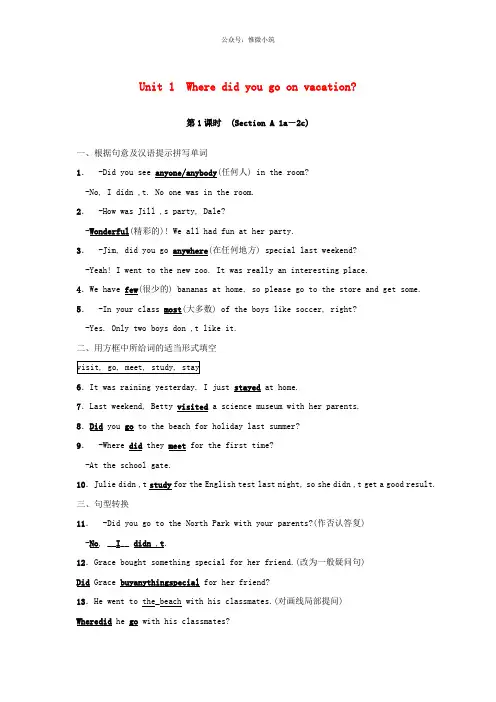
Unit 1 Where did you go on vacation?第1课时(Section A 1a-2c)一、根据句意及汉语提示拼写单词1. -Did you see anyone/anybody(任何人) in the room?-No, I didn ,t. No one was in the room.2. -How was Jill ,s party, Dale?-Wonderful(精彩的)! We all had fun at her party.3. -Jim, did you go anywhere(在任何地方) special last weekend?-Yeah! I went to the new zoo. It was really an interesting place.4.We have few(很少的) bananas at home, so please go to the store and get some. 5. -In your class most(大多数) of the boys like soccer, right?-Yes. Only two boys don ,t like it.二、用方框中所给词的适当形式填空6.It was raining yesterday. I just stayed at home.7.Last weekend, Betty visited a science museum with her parents.8.Did you go to the beach for holiday last summer?9. -Where did they meet for the first time?-At the school gate.10.Julie didn ,t study for the English test last night, so she didn ,t get a good result.三、句型转换11. -Did you go to the North Park with your parents?(作否认答复)-No, __I__ didn ,t.12.Grace bought something special for her friend.(改为一般疑问句)Did Grace buyanythingspecial for her friend?13.He went to the_beach with his classmates.(对画线局部提问)Wheredid he go with his classmates?14.Kevin went out with his_brother. (对画线局部提问)Whodid Kevin go with?15.Lucy did her homework late last night. (改为否认句)Lucy didn ,tdo her homework late last night.四、单词拼写Different students went to different places on 16.vacation/holiday(假期). Tina went to the mountains 17.with(和) her family and she 18.had(经历) a good time there. Tom went to summer 19.camp(营地) with his friends. They played games and did 20.something(某些事) exciting. It was 21.wonderful(精彩的). Where did Bob go? He 22.visited(拜访) his uncle. They went 23.fishing(钓鱼). 24.Most(大多数) of time they got many fish. Sally didn ,t go25.anywhere(任何地方). She just stayed at home to read and relax.五、完形填空I ,m Meg. I ,ll never __26__ the first time I was away from home for more than one or two nights. I was 11 years old and I went to summer camp __27__ one month. When my parents first __28__ me about the camp, I was excited. There were all kinds of __29__: swimming, baseball and even horse riding. My mom helped me __30__ which clothes to take and she packed my bag.My family drove me to the camp. When we arrived, I saw a lot of kids, __31__ I didn ,t know anyone! I began to feel __32__. I put on a shirt with my name on it. __33__, an older girl came up to me and said, "Hi, Meg!I ,m Sally. I will be your counselor(指导老师). Come and join __34__. Our group is The Pines.〞__35__ the time came for my mom and dad to say __36__. "Well, Meg, have a great time. Don ,t worry. We ,ll write to you often.〞 They said.I felt really bad. I __37__ to cry. But just then __38__ girl of my age came over and said, "Hi, are you Meg?I ,m Mary. I ,m in The Pines, too. Come on. Let ,s go and see the horses __39__.〞 So we went and enjoyed ourselves.For me, it was the __40__ summer ever.(C)26.A. start B. missC. forgetD. answer(C)27.A. in B. atC. forD. about(B)28.A. visited B. toldC. laughedD. taught (C)29.A. habits B. programsC. activitiesD. problems(D)30.A. sell B. showC. describeD. choose (A)31.A. but B. itC. soD. because(D)32.A. lucky B. happyC. tiredD. worried(C)33.A. After B. SoonC. LastD. First(A)34.A. us B. youC. herD. them(A)35.A. Finally B. LastC. EndD. After(B)36.A. sorry B. goodbyeC. thanksD. hello(C)37.A. learned B. decidedC. wantedD. hoped(D)38.A. other B. othersC. the otherD. another(D)39.A. yet B. onlyC. againD. together(B)40.A. good B. bestC. badD. worst。
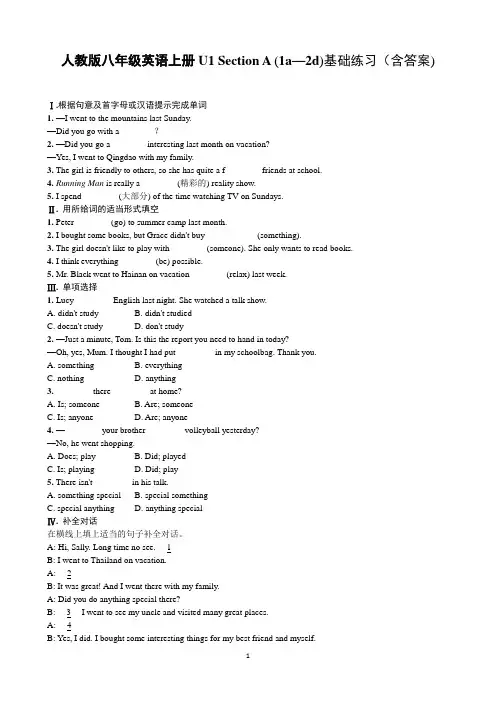
人教版八年级英语上册U1 Section A (1a—2d)基础练习(含答案)Ⅰ.根据句意及首字母或汉语提示完成单词1.—I went to the mountains last Sunday.—Did you go with a________?2.—Did you go a________ interesting last month on vacation?—Yes, I went to Qingdao with my family.3. The girl is friendly to others, so she has quite a f________ friends at school.4.Running Man is really a ________(精彩的) reality show.5. I spend ________(大部分) of the time watching TV on Sundays.Ⅱ. 用所给词的适当形式填空1. Peter ________(go) to summer camp last month.2. I bought some books, but Grace didn't buy ________ (something).3. The girl doesn't like to play with ________(someone). She only wants to read books.4. I think everything ________(be) possible.5. Mr. Black went to Hainan on vacation ________(relax) last week.Ⅲ. 单项选择1. Lucy ________ English last night. She watched a talk show.A. didn't studyB. didn't studiedC. doesn't studyD. don't study2.—Just a minute, Tom. Is this the report you need to hand in today?—Oh, yes, Mum. I thought I had put ________ in my schoolbag. Thank you.A. somethingB. everythingC. nothingD. anything3. ________ there ________ at home?A. Is; someoneB. Are; someoneC. Is; anyoneD. Are; anyone4.—________ your brother ________ volleyball yesterday?—No, he went shopping.A. Does; playB. Did; playedC. Is; playingD. Did; play5. There isn't ________ in his talk.A. something specialB. special somethingC. special anythingD. anything specialⅣ. 补全对话在横线上填上适当的句子补全对话。
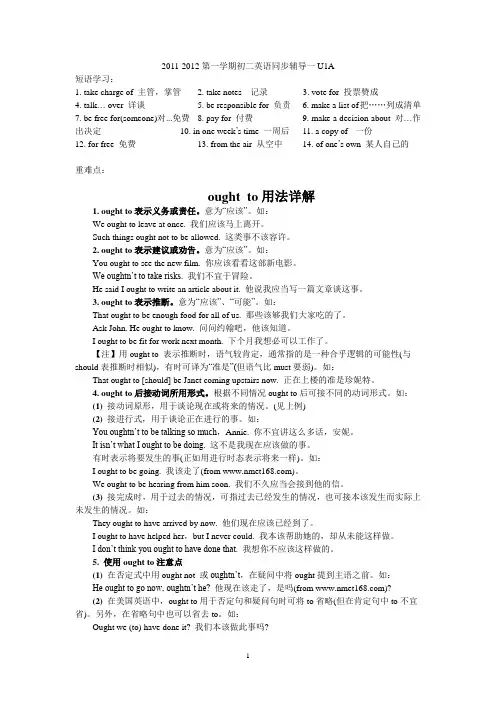
2011-2012第一学期初二英语同步辅导一U1A短语学习:1. take charge of 主管,掌管2. take notes 记录3. vote for 投票赞成4. talk… over 详谈5. be responsible for 负责6. make a list of把……列成清单7. be free for(someone)对...免费8. pay for 付费9. make a decision about 对…作出决定10. in one week’s time 一周后11. a copy of 一份12. for free 免费13. from the air 从空中14. of one’s own 某人自己的重难点:ought to用法详解1. ought to表示义务或责任。
意为“应该”。
如:We ought to leave at once. 我们应该马上离开。
Such things ought not to be allowed. 这类事不该容许。
2. ought to表示建议或劝告。
意为“应该”。
如:You ought to see the new film. 你应该看看这部新电影。
We oughtn’t to take risks. 我们不宜于冒险。
He said I ought to write an article about it. 他说我应当写一篇文章谈这事。
3. ought to表示推断。
意为“应该”、“可能”。
如:That ought to be enough food for all of us. 那些该够我们大家吃的了。
Ask John. He ought to know. 问问约翰吧,他该知道。
I ought to be fit for work next month. 下个月我想必可以工作了。
【注】用ought to 表示推断时,语气较肯定,通常指的是一种合乎逻辑的可能性(与should表推断时相似),有时可译为“准是”(但语气比must要弱)。
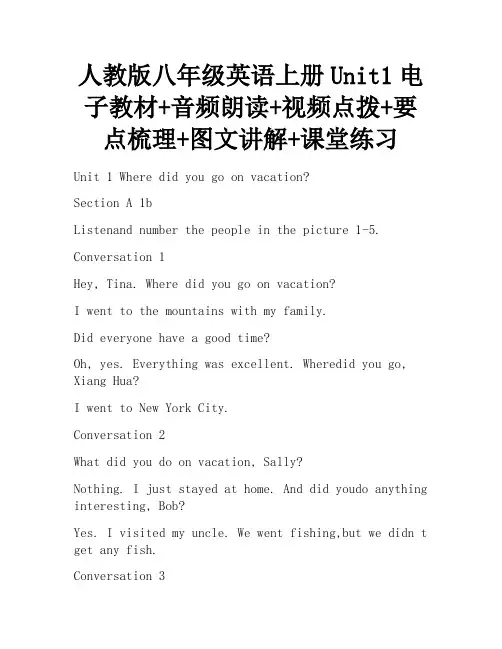
人教版八年级英语上册Unit1电子教材+音频朗读+视频点拨+要点梳理+图文讲解+课堂练习Unit 1 Where did you go on vacation?Section A 1bListenand number the people in the picture 1-5.Conversation 1Hey, Tina. Where did you go on vacation?I went to the mountains with my family.Did everyone have a good time?Oh, yes. Everything was excellent. Wheredid you go, Xiang Hua?I went to New York City.Conversation 2What did you do on vacation, Sally?Nothing. I just stayed at home. And did youdo anything interesting, Bob?Yes. I visited my uncle. We went fishing,but we didn t get any fish.Conversation 3Did you go anywhere on vacation, Tom?I went to summer camp. Did you go withanyone?Yes. I went with my friends. Everyone had agreat time.Section A 2aListen.Where did the people go on vacation? Complete the chart.Conversation 1Where did you go on vacation, Grace?I went to New York City.Oh, really? Did you go with anyone?Yes. I went with my mother.Did you go to Central Park?Yes, I did. It was really nice.Did you buy anything special?Yes. I bought something for my father.Oh, really? What?I bought him a hat.Conversation 2Where did you go on vacation, Kevin?I went to the beach.Oh, that s nice.Did you play volleyball?No, I didn t.Well, did you swim?Yes, I did. The water was really warm.How was the food?Everything tasted really good!Did you meet anyone interesting?Yes. I met some very interesting people. Conversation 3Where did you go on your vacation, Julie?I stayed at home.Oh. So, did you do anything interesting? No, I didn t.Did you study for your tests?Yes, I did.Did you go out with anyone?No. No one was here. Everyone was onvacation. Section A 2bListenagain. Check (√) Yes, I did or No, I didn t for each question.Conversation 1Where did you go on vacation, Grace?I went to New York City.Oh, really? Did you go with anyone?Yes. I went with my mother.Did you go to Central Park?Yes, I did. It was really nice.Did you buy anything special?Yes. I bought something for my father.Oh, really? What?I bought him a hat.Conversation 2Where did you go on vacation, Kevin?I went to the beach.Oh, that s nice.Did you play volleyball?No, I didn t.Well, did you swim?Yes, I did. The water was really warm.How was the food?Everything tasted really good!Did you meet anyone interesting?Yes. I met some very interesting people. Conversation 3Where did you go on your vacation, Julie?I stayed at home.Oh. So, did you do anything interesting?No, I didn t.Did you study for your tests?Yes, I did.Did you go out with anyone?No. No one was here. Everyone was on vacation. Section A 2dRole-playthe conversation.Hi, Helen. Long time no see.Hi, Rick. Yes, I was on vacation lastmonth. Oh, did you go anywhere interesting?Yes, I went to Guizhou with my family.Wow! Did you see Huang guo shu Waterfall?Yes, I did. It was wonderful! We took quitea few photos there. What about you? Did you do anything special last month?Not really. I just stayed at home most ofthe time to read and relax.Section B 1cListen.Lisa is talking about her vacation. Answer the questions.Hi, Lisa. How was your vacation?It was great! I went to Hong Kong with myfamily.Really? Wow! Did you do anything specialthere?Well, we went to a fun park. It was reallyexciting.Did you go shopping?Yeah, I did.How were the stores?Oh, they were very expensive, but I did buysomething for my best friend.And how were the people? Were theyfriendly?Yeah, they were really friendly. My parentshave some friends there, and we had dinner at their house.How was the food?It was delicious. I loved their homecooking.Did everyone have a good time?Oh, yes, we did. Everything was excellent.Section B 1dListenagain. Fill in the blanks.Hi, Lisa. How was your vacation?It was great! I went to Hong Kong with myfamily.Really? Wow! Did you do anything specialthere?Well, we went to a fun park. It was reallyexciting.Did you go shopping?Yeah, I did.How were the stores?Oh, they were very expensive, but I did buysomething for my best friend.And how were the people? Were theyfriendly?Yeah, they were really friendly. My parentshave some friends there, and we had dinner at their house.How was the food?It was delicious. I loved their homecooking.Did everyone have a good time?Oh, yes, we did. Everything was excellent.Section B 2bReadJane s diary entries about her vacation and answer the questions.Monday, July 15thI arrived in Penang in Malaysia thismorning with my family. It was sunny and hot, so we decided to go to the beachnear out hotel. My sister and I tried paragliding. I felt like I was a bird. Itwas soexciting!For lunch, we had something veryspecial—Malaysian yellow noodles. They were delicious! In the afternoon, werode bicycles to George town. There are a lot of new buildings now, but many ofthe old buildings are still there. In Weld Quay, a really old place inGeorgetown, we saw the houses of the Chinese traders from 100years ago. Iwonder what life was like here in the past.I really enjoyed walking around thetown.Tuesday, July 16thWhat a difference a day makes! My fatherand I decided to go to Penang Hill today. We wanted to walk up tothe top, butthen it started raining a little so we decided to take the train. We waitedover an hour for the train because there were too many people. When we got tothe top, it was raining really hard. We didn t have an umbrella so we were wetand cold. It wasterrible! And because of the bad weather, we couldn tseeanything below. My father didn t bring enough money, so we only had one bowl ofrice and some fish. The food tasted great because I was so hungry!翻译:Section A你去哪里度假了?我去爬山了。
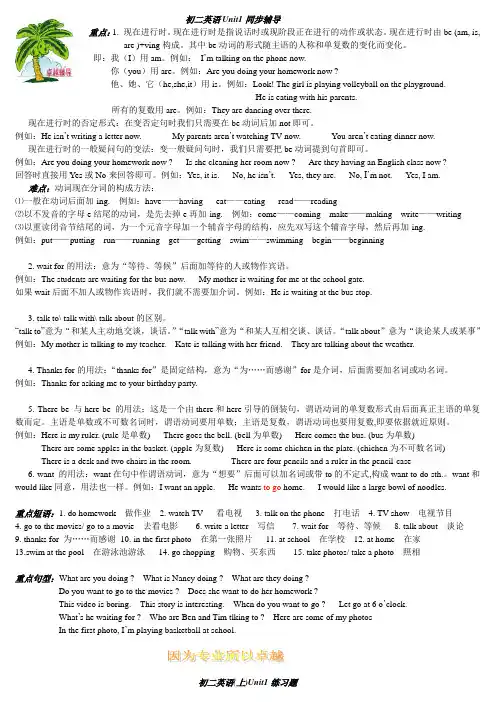
初二英语Unit1同步辅导重点:1. 现在进行时。
现在进行时是指说话时或现阶段正在进行的动作或状态。
现在进行时由be (am, is, are )+ving构成。
其中be动词的形式随主语的人称和单复数的变化而变化。
即:我(I)用am。
例如:I’m talking on the phone now.你(you)用are。
例如:Are you doing your homework now ?他、她、它(he,she,it)用is。
例如:Look! The girl is playing volleyball on the playground.He is eating with his parents.所有的复数用are。
例如:They are dancing over there.现在进行时的否定形式:在变否定句时我们只需要在be动词后加not即可。
例如:He isn’t writing a letter now. My parents aren’t watching TV now. You aren’t eating dinner now.现在进行时的一般疑问句的变法:变一般疑问句时,我们只需要把be动词提到句首即可。
例如:Are you doing your homework now ? Is she cleaning her room now ? Are they having an English class now ?回答时直接用Yes或No来回答即可。
例如:Yes, it is. No, he isn’t. Yes, they are. No, I’m not. Yes, I am.难点:动词现在分词的构成方法:⑴一般在动词后面加-ing. 例如:have——having eat——eating read——reading⑵以不发音的字母e结尾的动词,是先去掉e再加-ing. 例如:come——coming make——making write——writing⑶以重读闭音节结尾的词,为一个元音字母加一个辅音字母的结构,应先双写这个辅音字母,然后再加-ing.例如:put——putting run——running get——getting swim——swimming begin——beginning2. wait for的用法:意为“等待、等候”后面加等待的人或物作宾语。
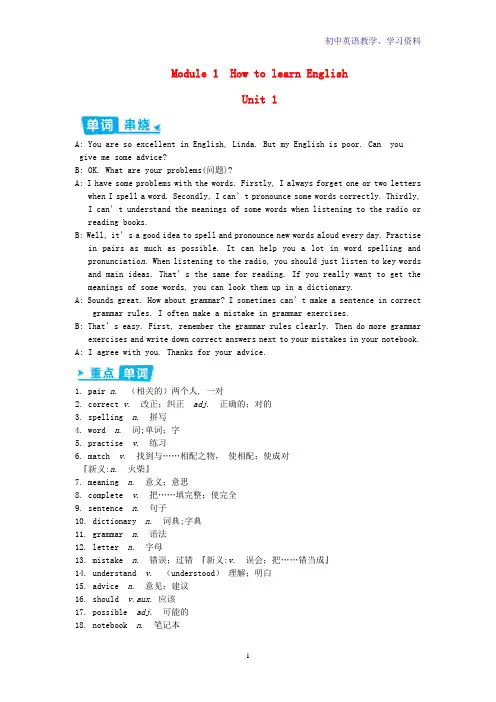
Module 1 How to learn EnglishUnit 1A: You are so excellent in English, Linda. But my English is poor. Can yougive me some advice?B: OK. What are your problems(问题)?A: I have some problems with the words. Firstly, I always forget one or two letters when I spell a word. Secondly, I can’t pronounce some words correctly. Thirdly,I can’t understand the meanings of some words when listening to the radio orreading books.B: Well, it’s a good idea to spell and pronounce new words aloud every day. Practi se in pairs as much as possible. It can help you a lot in word spelling and pronunciatio n.When listening to the radio, you should just listen to key words and main ideas. That’s the same for reading. If you really want to get the meanings of some words, you can look them up in a dictionary.A: Sounds great. How about grammar? I sometimes can’t make a sentence in correct grammar rules. I often make a mistake in grammar exercises.B: That’s easy. First, remember the grammar rules clearly. Then do more gram mar exercises and write down correct answers next to your mistakes in your notebook. A: I agree with you. Thanks for your advice.1. pair n.(相关的)两个人, 一对2. correct v.改正;纠正adj.正确的;对的3. spelling n.拼写4. word n.词;单词;字5. practise v.练习6. match v.找到与……相配之物,使相配;使成对『新义:n.火柴』7. meaning n.意义;意思8. complete v.把……填完整;使完全9. sentence n.句子10. dictionary n.词典;字典11. grammar n.语法12. letter n.字母13. mistake n.错误;过错『新义:v.误会;把……错当成』14. understand v.(understood)理解;明白15. advice n.意见;建议16. should v.aux.应该17. possible adj.可能的18. notebook n.笔记本19. forget v.(forgot)忘;忘记20. pronounce v.发……的音21. aloud adv.大声地;出声地22. radio n.电台;广播23. pronunciation n.发音24. key adj.关键性的,非常重要的『新义:n.钥匙;答案;(钢琴、计算机等的)键』25. main adj.主要的;最大的26. excellent adj.极好的;优秀的27. agree v.赞同1. correct adj.正确的;对的→ correctly ad v.正确地;对地2. mean v.意思是;意味着→ meaning n.意义;意思3. understand v.理解;明白过去式 understood adj.→ understanding 善解人意的4. possible adj.可能的→ possibly ad v.可能地5. forget v.忘;忘记过去式 forgot6. pronounce v.发……的音→ pronunciation n.发音7. agree v.赞同→ agreement n.协议1. practise doing sth. 练习做某事2. match… with… 把……与……匹配/搭配3. look up 查;查找4. make a mistake犯错误5. try to do sth. 尽力做某事6. as much as possible 尽可能多地7. write down写下;记下8. forget to do sth. 忘记做某事9. be good for… 对……有益10. need to do sth. 需要做某事11. get to know 开始认识;逐渐了解12. agree with sb. 同意某人1. 在课堂上我们应该一直讲英语。
2019-2020 年八年级英语上册Module 1 Learning Methods同步指导及练习外研版一 .教学重、难点:1.熟练了解与运用本模块的词汇;2.学习了解一些学习英语的方法,帮助学生养成良好的英语学习习惯;3.了解记忆类型,并学会科学的记忆方法。
二 .词和短语:(一)本模块是围绕学习英语的方法展开的, 现将有关与此的短语或句子总结如下:Learning methods学习方法( How to improve your English)如何提高你的英语。
1. watch TV programmes on CCTV 9.看中央 9 上的电视节目。
2. read English newspapers and magazines.看英语报纸和杂志。
3. watch English films on DVDs or videos通过 DVD 或录像看英语电影。
4. talk to foreigners与外国人交谈。
5. talk to each other in English用英语彼此交谈。
6. listen to English radio programmes =listen to English pogrammes on the radio收听英语广播节目。
7. learn English on the Internet / the computer在互联网电脑上/ 学习英语。
8. sing English songs唱英语歌9. write notes from the textbook从课本中写一些笔记(二)其他短语:1. a good way to improve your English提高英语的好方法2. excellent idea好主意3. at the weekend在周末4. afford to have them买得起它们5. save up money攒钱6. play some sports做一些运动7. do some grammar exercises做一些语法练习8. the correct way to study English学习英语的正确方法.9. get good results得到好分数10. to do this为了做到这个11. several types of memory几种记忆的类型12. in our brain在我们的大脑中13. short- term memory短期记忆14. long–term memory长期记忆15. write it down把它记下来16. the next day第二天We’ ll correct it and send it back to you the next day.17. in this case在这种情况下18. be useful for getting good results对得到好分数是有作用的19. repeat the information重复这个信息20. several times几次21. after several weeks几周后22. send an email through the Internet通过互联网发送一封电子邮件三 .重点句式的讲解与分析.1. It’ s good to talk to foreigners.与外国人交谈是有好处的。
Unit 1同步讲解及练习学习目标【实战演练】根据汉语意思完成句子,每空一词。
1. 箱子里几乎没有苹果了。
There are ______ _______ in the box.2. 食物好吃极了,因为我太饿了。
The food ______ _______ because I was so hungry!3. 我感觉自己就像一只鸟,太兴奋了。
I ______ _______ I was a bird. It was so exciting!4. 我没有足够的钱买iPhone 6。
I haven’t ______ _______ to buy an iPhone 6.5. 我在这家店里找到了一些有趣的东西。
I found ______ _______ in the shop.答案:1. few apples2. tasted great3. felt like4. enough money5. something interesting重点单词1. few 考查热度★★★【重点解读】few作形容词或代词,意为“不多;很少”。
用来修饰或指代复数可数名词,表示否定。
【例句展示】He is new here, so he has few friends. 他是刚来这儿的,所以几乎没有朋友。
I have quite a few friends here. 我这里有相当多的朋友。
【知识拓展】▼few, a few用来修饰可数名词;little, a little 用来修饰不可数名词;few, little表示否定,意为“不多;很少;几乎没有”;a few, a little表示肯定,意为“一些;少许”。
There are a few students doing their homework; few students play outdoors. 一些学生正在做作业;很少有学生在户外玩耍。
They can bring a little water to school, but there is little water in the afternoon. 他们可以带一些水去学校,但是到下午就几乎没有水了。
八年级上册人教版u1diudiu教英语1a1、Some students are able to find jobs after graduation while _____will return to school for an advanced degree. [单选题] *A. otherB. anotherC. others(正确答案)D. the other2、We ______ to set up a food bank to help hungry people next week.()[单选题] *A. hadB. are going(正确答案)C. were goingD. went3、Simon does not()his fellow workers because they often argue over trivial matters. [单选题] *A. get on with(正确答案)B. come up withC. do away withD. go on with4、How I wish I()to repair the watch! I only made it worse. [单选题] *A. had triedB. hadn't tried(正确答案)C. have triedD.didn't try5、Study hard, ______ you won’t pass the exam. [单选题] *A. or(正确答案)B. andC. butD. if6、Mom, I need you ______ me a pencil box.()[单选题] *A. buyB. buyingC. to buy(正确答案)D. to buying7、In winter, animals have a hard time_____anything to eat. [单选题] *A.to findB.finding(正确答案)C.foundD.to finding8、He’s so careless that he always _______ his school things at home. [单选题] *A. forgetsB. leaves(正确答案)C. putsD. buys9、David ______ at home when I called at seven o’clock yesterday evening. ()[单选题] *A. didn’tB. doesn’tC. wasn’t(正确答案)D. isn’t10、I _______ the job because I couldn’t stand(忍受) the rules. [单选题] *A. gave inB. gave outC. gave backD. gave up(正确答案)11、Nearly two thousand years have passed _____ the Chinese first invented the compass. [单选题] *A. whenB. beforeC. since(正确答案)D. after12、The car _______ after forty minutes driving, so he didn’t have the interview on time. [单选题] *A. broke down(正确答案)B. broke inC. broke outD. broke up13、She’s _______ with her present _______ job. [单选题] *A. boring; boringB. bored; boredC. boring; boredD. bored; boring(正确答案)14、Be careful when you _______ the street. [单选题] *A. are crossingB. is crossingC. cross(正确答案)D. is cross15、These apples smell _____ and taste ______. [单选题] *A. well; wellB. good; good(正确答案)C. well; goodD. good; well16、So many people will _______ to their work after the Spring Festival. [单选题] *A. get inB. get onC. get offD. get back(正确答案)17、—Why is Mary asking Bob about the school trip? —Because she wants to know ______.()[单选题] *A. how does he think of the tripB. what does he think of the tripC. what he likes the tripD. how he likes the trip(正确答案)18、Obviously they didn’t see the significance of the plan. That is()the problem lies. [单选题] *A. where(正确答案)B. whyC. /D. how19、If you had told me earlier, I _____ to meet you at the hotel. [单选题] *A. had comeB. will have comeC. would comeD. would have come(正确答案)20、—______ pencils are these?—They are Tony’s.()[单选题] *A. WhatB. WhereC WhoD. Whose(正确答案)21、( ). I’m _____ in that ______ film [单选题] *A. interesting interestedB. interested interesting(正确答案)C. interested interestedD. interesting interesting22、Almost every one of us could see her anxiety from the()on her face. [单选题] *A. appearanceB. feelingC. movementD. expression(正确答案)23、_______ your help, I passed the English exam. [单选题] *A. ThanksB. Thanks to(正确答案)C. Thank youD. Thank to24、I will _______ at the school gate. [单选题] *A. pick you up(正确答案)B. pick up youC. pick you outD. pick out you25、What did you _______ at the meeting yesterday? [单选题] *A. speakB. tellC. say(正确答案)D. talk26、Our school is beautiful. How about _______? [单选题] *A. theirs(正确答案)B. theirC. theyD. them27、70.Would you like ________,sir? [单选题] *A.something else(正确答案)B.nothing elseC.else somethingD.else anything28、You might not like the way Sam behaves, but please be kind to him. _____, he is your grandfather. [单选题] *A. After all(正确答案)B. Above allC. In allD. At all29、—What were you doing when the rainstorm came?—I ______ in the library with Jane. ()[单选题] *A. readB. am readingC. will readD. was reading(正确答案)30、Amy and her best friend often ______ books together.()[单选题] *A. read(正确答案)B. readsC. is readingD. to read。
八年级英语学科Unit1Where did you go on vacation? 教案New languages:1. Master the new vocabulary words.2. Master the past forms of the regular and irregular verbs.3. New target language:Where did you go on vacation?We went to New York City.Did you go to Central Park?Yes, I did.How was the weather? It was humid.4. Be able to talk about the recent past events.Difficult points:1. Master the past forms of the regular and irregular verbs.2. Use the new language to talk about recent past events. Teaching aids:recordersome pictures of activities and placesTeaching periods:Period 1: Section A 1a-Grammar focusPeriod 2: Section A 3a-4Period 3: Section B 1a-2cPeriod 4: Section B 3a-Self-checkPeriod 1Teaching aims:1. Learn the new vocabulary words:2. Target language:Where did you go on vacation? We went to summer camp. Where did he go on vacation? He stayed at home.Where did they go on vacation? They visited the museum. Did you/he/she/they go to Central Park?Yes, I/he/she/they did.No, I/he/she/they didn’t.3. Master the past forms of the regular and irregular verbs.4. Learn to talk about recent past events.Teaching procedures:Step 1. Warm-up2Talk about the past activities:A: How was your weekend? B: It was great.A: What did you do last weekend? B: I…A: How was his/her weekend? B: It was awful.A: What did he/she do last weekend? B: He/she…Ask and answer more activities.Step 2. Learn the new vocabulary words1. Teacher asks one student to read the new words. And see if he or she can read the new words correctly.2. Practice reading the new words: repeat after the teacher;read together/in parts/one by one. Then read and remember the words.3. Explain some words: go to a summer camp; a Central Park; have a math examStep 3. Presentation1. Show a picture of New York City. Ask “Where did you go on vacation last summer?” Present students to say: “I went to New York City.” Then ask more students to answer the question. Their answers may be varied. (summer camp; went to the beach; visited museums.)2. Ask some students to ask and answer the questions in pairs. A: Where did you go on vacation?B: I went to the beach.Practice asking and answering the conversation.Step 4. 1a Look and match1. The teacher reads the instructions to the students.2. Students read the activities in the box first. Teacher canget one student to explain them in Chinese. Then get students to complete by themselves.3. Check up the answers.Step 5. 1b Listening practice1.The teacher reads the instructions to the students.2. Get the students to read the names in the box after teacher.3. Tell students to look at the pictures and say what the person did in each picture. For example: She went to the mountains.4. Tell students they will hear three conversations. People talk about what they did on vacations. Then play the recording. Students listen the first time.Students only listen.5. Play the recording again and try to fill in the blanks with the numbers.6. Check up the answers.Play the recording, let the students repeat after therecording. Then practice reading the conversation.Step 6. 1cPair work1. The teacher explains the instructions to the students.2. The students practice reading the conversation below inactivity1c.3. Make their own conversations with the activities in activity 1a. Ask“Where did Brad/Sally/Tom go on vacation? ”Then work it in class.Step 7. 2a Listening practice1. Get students to read the names and the activities in the box. Tell students: they will hear three conversations about three people’s vacations. Match the people with the activities.2. Play the recording the first time, students only listen.3. Replay the recording and try to match.4. Check up the answers.Step 8. 2b Listening practice1. Students look at the chart and read the names and the activities.Say, listen to the conversations and check “Yes, I did.” Or “No, I didn’t.”2. Play the recording the first time. Students only listen.3. Play the recording again. Students try to fill the blanks.4. Check up the answers.5. Get the students to repeat after the recording.Step 9. 2cGroup work1. The teacher explains the instructions to the students. Students read theexample in the speech bubbles.2. Work in groups to role play the conversation. You can talk about theactivities from the chart in 2b or other activities. Theteacher move around and give help if students need.3.Ask one or two groups to work in class.Step 10.Grammar focusThe students read the sentences. And find if there are some questions. Ifhave, explain them.Step 11. Summary1. The new vocabulary words.2. The new target language.Step 12.Homework1. Revise the vocabulary words.2. Make a conversation about your last vacation.。
Unit 1 Where did you go on vacation?Section A (1a-2d)一、教学目标:1. 学生能掌握以下单词:anyone, anywhere, wonderful, quite a few, most, something, nothing,everyone, of course, myself, yourself能掌握以下句型:①—Where did you go on vacation? —I went to the mountains.②—Where did Tina to on vacation? —She went to the beach.③—Did you go with anyone? —Yes, I did./No, I didn’t.能了解以下语法:—复合不定代词someone, anyone, something, anything等的用法。
—yourself, myself等反身代词的用法。
一般过去时态的特殊疑问句,一般疑问句及其肯定、否定回答。
2. 学生会用一般过去时进行信息交流,培养学生的环保意识,热爱大自然。
二、教学重难点1. 教学重点:1) 用所学的功能语言交流假期去了哪里旅行。
2) 掌握本课时出现的新词汇。
2. 教学难点:1)复合不定代词someone, anyone, something, anything等的用法。
2) yourself, myself等反身代词的用法。
三、教学过程Ⅰ. Lead-in1. 看《北京城市宣传片》进入本课时的主题谈论上周末做了些什么事情,谈论过去发生的事情。
Ⅱ. Presentation1.learn some new words1. Show some pictures on the big screen. Let Ss discuss.2. Pay attention to the pictures. Ask: What can you see? Say: Each picture shows what a person did on summer vacation. Name each activity and ask students to repeat: stayed at home, did volunteer work, went to Beijing, went to the beach, visited museums, went to summer campWork on 1a:1) stayed at home __2). went to New York City __3) visited my uncle __4) went to summer camp __5) went to the mountains __6) went to the beach __7) visited museums ___3. Now, please match each phrase with one of the pictures next to the name of the activity,point to the sample answer.4. Check the answers. Answers: 1. f 2. b 3. g 4. e5. c6. a7. dIII. Listening1. Point to the picture on the screen.T: Look at the picture. Where did Tina go on vacation? She went to the mountains.There are three conversations. The people talk about what they did on vacation. Listen to the recordingand write numbers of the names in the right boxes of the picture.2. Check the answers.3. Listen to the conversations again and pay attention to the word in red. Conversation 1Xiang Hua: Hey, Tina. Where did you go on vacation?Tina: I went to the mountains with my family.Xiang Hua: Did everyone have a good time?Tina: Oh, yes. Everything was excellent. Where did you go, Xiang Hua?Xiang Hua: I went to New York City.Conversation 2Girl: What did you do on vacation, Sally?Sally: Nothing. I just stayed at home.Girl: And did you do anything interesting, Bob?Bob: Yes. I visited my uncle. We went fishing, but we didn’t get any fish. Conversation 3Boy: Did you go anywhere on vacation, Tom?Tom: I went to summer camp.Boy: Did you go with anyone?Tom: Yes. I went with my friends. Everyone had a great time.发现:go on vacation去度假go to the mountains去爬山go to summer camp去夏令营—Where did…go on vacation?—I went to...—Did…go with anyone?—Yes, ...I went with...IV.Pair work1. Point out the sample conversation. Ask two Ss to read the conversation to the class.2. Now work with a partner. Make your own conversation about the people in the picture.3. Ss work in pairs. As they talk, move around the classroom and give any help they need.4. Let some pairs act out their conversations.V. Listening1. Pre-ListeningT: Look at the picture. Where was this girl? Was she in a park? Or was she on the beach?Tell Ss they will hear three students’ conversationsLet Ss read the phrases in the chart of 2b.2. While-listeningWork on 2a: play the recording the first time. Ss listen and fill in the chart.Work on 2b: play the recording the second time for the Ss to check “Yes, I did.” or “No, I didn’t.” Check the answers with the Ss.3. Listen to conversation 1 and fill in the blanks.Grace went to _______________ for her vacation. She went with _____________.She went to Central Park, and she bought _______ for her father.Listen to conversation 2 and fill the blanks.Kevin went to beach for his vacation. He didn’t play __________, but he went ___________. The food tasted really good. And he met some __________________.Listen to conversation 3 and fill in the blanks.Julie stayed at home. She didn’t do anything interesting. She study for ______. Because everyone was on vacation, she _______ go out with anyone.发现:go to the beach去海滩buy sth. for sb.(= buy sb. sth.)taste good尝起来不错stay at home待在家study for tests备考go out 外出(娱乐)VI. Pair work1. Let two Ss read the conversation between Grace, Kevin and Julie.2. Let Ss work in pairs and try to role-play the conversation.A: Grace, where did you go on vacation?B: I went to New York City.A: Oh, really? Did you go with anyone?B: Yes, I went with my mother.3. Ask some pairs to act out their conversations.Ⅶ.Language points1. Did you buy anything special?在英语中,anything, something, nothing和everything是用于指代事物的复合不定代词,与之相对应的复合不定代词anyone, someone, no one和everyone (anybody, somebody, nobody和everybody) 用于指人。
2009第一学期初二英语同步辅导一U1A短语学习:1. take charge of 主管,掌管2. take notes 记录3. vote for 投票赞成4. talk… over 详谈5. be responsible for 负责6. make a list of把……列成清单7. be free for(someone)对...免费8. pay for 付费9. make a decision about 对…作出决定10. in one week’s time 一周后11. a copy of 一份12. for free 免费13. from the air 从空中14. of one’s own 某人自己的重难点:ought to用法详解1. ought to表示义务或责任。
意为“应该”。
如:We ought to leave at once. 我们应该马上离开。
Such things ought not to be allowed. 这类事不该容许。
2. ought to表示建议或劝告。
意为“应该”。
如:You ought to see the new film. 你应该看看这部新电影。
We oughtn’t to take risks. 我们不宜于冒险。
He said I ought to write an article about it. 他说我应当写一篇文章谈这事。
3. ought to表示推断。
意为“应该”、“可能”。
如:That ought to be enough food for all of us. 那些该够我们大家吃的了。
Ask John. He ought to know. 问问约翰吧,他该知道。
I ought to be fit for work next month. 下个月我想必可以工作了。
【注】用ought to 表示推断时,语气较肯定,通常指的是一种合乎逻辑的可能性(与should表推断时相似),有时可译为“准是”(但语气比must要弱)。
如:That ought to [should] be Janet coming upstairs now. 正在上楼的准是珍妮特。
4. ought to后接动词所用形式。
根据不同情况ought to后可接不同的动词形式。
如:(1)接动词原形,用于谈论现在或将来的情况。
(见上例)(2)接进行式,用于谈论正在进行的事。
如:You oughtn’t to be talking so much,Annie. 你不宜讲这么多话,安妮。
It isn’t what I ought to be doing. 这不是我现在应该做的事。
有时表示将要发生的事(正如用进行时态表示将来一样)。
如:I ought to be going. 我该走了(from )。
We ought to be hearing from him soon. 我们不久应当会接到他的信。
(3)接完成时,用于过去的情况,可指过去已经发生的情况,也可接本该发生而实际上未发生的情况。
如:They ought to have arrived by now. 他们现在应该已经到了。
I ought to have helped her,but I never could. 我本该帮助她的,却从未能这样做。
I don’t think you ought to have done that. 我想你不应该这样做的。
5. 使用ought to注意点(1)在否定式中用ought not 或oughtn’t,在疑问中将ought提到主语之前。
如:He ought to go now, oughtn’t he? 他现在该走了,是吗(from )?(2)在美国英语中,ought to用于否定句和疑问句时可将to省略(但在肯定句中to不宜省)。
另外,在省略句中也可以省去to。
如:Ought we (to) have done it? 我们本该做此事吗?"Ought I to go?" "Yes, you ought (to)." “我该去吗?”“对,你该去。
”Should 的用法详解1. 应该:用来表示义务或职责:You should send her a note.你应该给她留一个条2.用于表示可能性或期望:They should arrive at noon.她应该在中午到达3.用于表示可能性或可能发生的事件:If she should fall, then so would I.如果她失败了,那我也会失败4.用于使一个直接或直率的陈述变得婉转:I should think he would like to go.我倒是认为他愿意去ought to与should的用法区别1.一般说来,两者可替换,只是ought to语气稍重。
如:You ought to [should] go and see Mary sometime. 你应该什么时候去看看玛丽。
The train ought to [should] have arrived at six. 火车本应该6点钟到的。
2.表示出于法令规则、行为准则、道德责任等客观情况而“应该”做某事时,一般应用ought to,若用should则含有个人意见,强调主观看法。
如(from ):We ought to go and see Mary tomorrow, but I don’t think we will. 明天我们按理应该去看看玛丽,但是我认为我们不会去(此句不宜用should)。
3.在公告、须知或条例中,出于礼貌,常用should。
如:You should not run alongside the swimming-pool. 不准在游泳池边奔跑。
专项练习1) You____ all those clothes! We have a washing machine to do that sort of thingA) needn't have washed B) shouldn't have washedC) must not have washed D) can not have washed2) John's score on the test is the highest in the class; he____ last night.Ashould study B. should have studied C must have studied D. must have to study3) The room is in a terrible mess; it ____cleaned. (CET-4, 1996,6)A) can't have been B) shouldn't have been C) mustn't have been D) wouldn't have been4) Nobody knows how people first came to these islands. They ____ from South America on rafts.A) must have sailed B) can sail C) might have sailed D) should have sailed5) Mary was not in her bedroom yesterday afternoon. She ____ in her classroom.A) should have been B) must have been C) must be D) should be6) Bob said he was going to join our club but he didn't. He ____ his mind.A) can't have changed B) wouldn't have changedC) must have changed D) shouldn't have changed7) You____ to town to see the film yesterday. It will be on TV tonight.A) needn't go B) had better not go C) should not go D) needn't have gone8) We____ the letter yesterday, but it didn't arrive.A) must receive B) ought to receive C) must have received D) ought to have received9) With all the work on hand, he____ to the cinema last night.A) mustn't go B) shouldn't have gone C) could not go D) couldn't have gone10) Eve was late for class again. She ____earlier.A) should get up B) must get up C) need to get up D) should have got up11) I am feeling sick. I____ so much chocolate.A) needn't have eaten B) couldn't have eatenC) mustn't have eaten D) shouldn't have eaten12) I didn't send out my application form last week, but I ____.A) had B) would do C) should have D) might have to13) Walking alone in the deserted village, John was scared. He thought he____ Tom to go with him.A) might have asked B) should asked C) must have asked D) should have asked14) When I got to the cinema, the film had already started; I____ there earlier.A) ought to get B) ought to have got C) must have got D) must get小测题15) The road was muddy. It____ last night.A) must rained B) must have rained C) must be rained D) could have rained16) She can speak quite fluent English. She____.A) must been in the U.S.A. for some timeB) must have been in the U.S.A. for some timeC) should have been in the U.S.A. for some timeD) May be in the U.S.A. for some time17) You should bear in mind that he is not so strong as he____.A) was used to be B) used to be C) was used to D) use to18)“We didn't see him at the exhibition yesterday.”“He ___it.”A) mustn't visit B) can't have visited C) should have gone to see D) may see19) Mary ____my letter, otherwise she would have replied before now.A) should have received B) has receivedC) Couldn't have received D) ought to have received20) I ____ you a valuable present for your birthday, but I was short of money.A) would have liked to give B) liked to giveC) have liked to give D) would like to give21)“Where ____ my umbrella?”“Somebody ____ it away by mistake.”A) is, must have taken B) is, must take C) have been, must take D) is, takes22) What ____ would happen if the director knew you felt that way?A) will you suppose B) you suppose C) do you suppose D) you would suppose23) Two eyes ____see more than one.A) can B) may C) will D) should24) ____ you continue in your efforts and achieve new and greater successes.A) Would B) Will C) May D) Should25) We ought to help each other in our work, ____?A) oughtn't we B) should we C) shouldn't we D) ought to we26) Tom ____ better than to ask Dick for help.A) shall know B) shouldn't know C) has known D) should have known27) You ____ your tooth pulled out before it rot completely.A) had better got B) had to get better C) had better to get D) had better get28) When we got to the cinema, the film hasn't started yet, so we ____.A) needn't hurry B) didn't need hurry C) needn't to hurry D) needn't have hurried29) It was really very dangerous; you ____ him seriously.A) might have injured B) could injure C) should have injured D) must injure30) As he had heart attack, he was told that he ____ continue the work.A) needn't B) may not C) mustn't D) can't31) An Englishman who ____not speak Italian was once traveling in Italy.A) must B) could C) may D) might32) I ____like to make a suggestion.A) could B) would C) must D) might33) I know things are hard with you, but you ____try to get over the difficulties.A) can B) may C) must D) ought34 I can't find the recorder in the room. It ____ by somebody.A) may have been taken away B) may leave C) may take away D) must have taken away35) He ____the 9:20 train because he didn't leave home till 9:25.A) can reach B) could catch C) may not catch D) couldn't have caught知识点详析:1. take charge of 主管She take charge of our class. 她是我们的班主任。